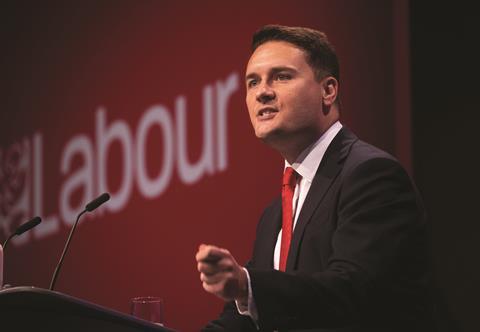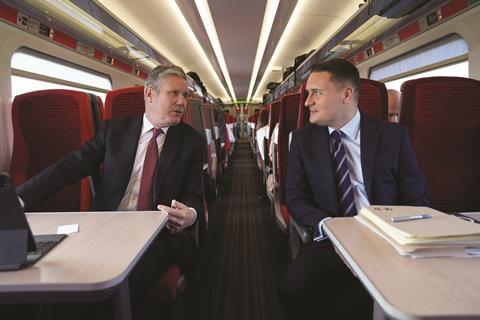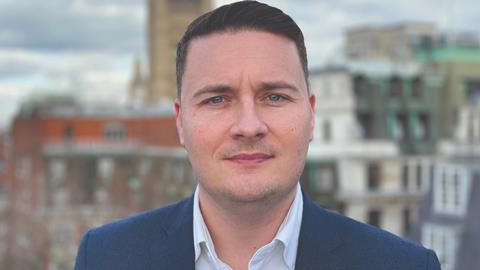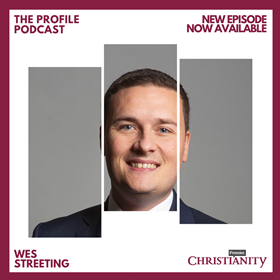Labour’s shadow health minister Wes Streeting MP talks about growing up in poverty, reconciling his faith and sexuality, and building bridges across political and religious divides
It isn’t just Wes Streeting’s background that makes him something of a political unicorn. Born to a teenage mum, Streeting’s early years were a struggle. Yet he graduated from the University of Cambridge with a passion for social justice, and is now one of the Labour party’s brightest stars – hotly tipped as a potential future leader.
Streeting also speaks with an artlessness that is rare in a politician. When asked last year on TalkRadio whether a woman could have a penis, rather than ducking the question (as his party leader and deputy both did) he answered simply: “Men have penises, women have vaginas; here ends my biology lesson,” before wryly adding: “This is the end of my leftie street cred, if I had any in the first place.”
A working-class boy who loves the “smells and bells” of high Anglicanism, he is open about his strong Christian faith, and his identity as a gay man. Throughout our interview, which the shadow secretary of state for health has squeezed into the busy week in which the NHS turned 75, we barely touch on his portfolio. Instead, I pepper him with hard questions on the thorny issues that arise when faith, sexuality and politics collide.
I’ve got to a place now where I can finally reconcile my identity with my theology
There are “no uncomfortable questions” he tells me as we begin and, in the most part, answers everything I ask candidly. The only time I am given a party line is when we broach the topic of sex education. After a non-answer about safeguarding and consent, I press him again. Most Christians don’t have a problem with safeguarding, I suggest. But they don’t want to be sacked, cancelled or called transphobes for holding traditional views on marriage, sexuality and gender. Is there space, in today’s culture wars, to disagree well? Streeting, himself an ex-Stonewall employee, answers with an emphatic yes. “We live in a liberal democracy – and that cuts both ways”, he says.
Good faith when discussing tough issues is, sadly, in short supply, Streeting reflects, as our time draws to an end. He was particularly keen to speak to Premier Christianity precisely because of this, he adds.
As I step back out into the sunshine, I reflect on our interview. Disagreeing with someone’s views, while still respecting them as a person, should be a basic prerequisite for a compassionate, democratic society, but such conversations can sometimes feel more like a battle than a grown-up discussion. Not so with Streeting. It’s rare to meet a politician so willing to wear his heart on his sleeve. And while I don’t share his point of view on everything, I do commend him for his honesty, and genuine desire to reach across the religious and political divides.
Whatever our views, the world just might be a better place if we were all a little bit more Wes.
Tell me about your childhood.
I wrote the book One Boy, Two Bills and a Fry Up [Hodder & Stoughton] because I think people have a certain view about politicians and our backgrounds. I grew up in a very working-class family and experienced poverty. But my family experiences are extraordinary even by those standards. The two Bills are my two grandfathers. On my dad’s side is Bill Streeting, Royal Navy veteran, civil engineer. He was a pull-yourself-up-by-your-bootstraps working-class Tory. He was a Christian, and by far and away the most important relationship I’ve had in my 40 years.

Bill Crowley, my mum’s dad, was the total opposite: in and out of prison throughout my mum’s and my childhood. In later life, he opened up about the physical and sexual abuse he experienced at the hands of his father. I used to debate with him about politics, religion – he was a staunch atheist – and think: How has someone this smart, well read, funny and kind ended up in prison? Suddenly, his childhood made that make sense.
And then there’s the fry up. My mum was 18 and my dad 17 when I was conceived. My mum was under enormous pressure to have an abortion – the whole family agreed it was the right thing to do – but, in the days leading up to the appointment, she had a change of heart. On the day of the appointment, she did what she was explicitly told she mustn’t do: eat. She cooked herself a full English breakfast, knowing there was no way she could then be browbeaten into it. The fry up literally saved my life.
Your grandad was a Christian but apart from his faith, which you explain in the book was fairly private, you didn’t really have any other faith influences, did you?
Not in my family. I went to St Peter’s [primary school] in Wapping, which was connected to St Peter’s Church. I loved the smells and bells of Anglicanism. It wasn’t just the singing of the hymns or the smell of the incense, I was listening to what was being said. I very much believed in God and was a committed Christian.
When we were given the opportunity to be baptised and confirmed, I wanted to do it. The hardest job was convincing my then-atheist mum and still-atheist dad. In the end, I deployed my grandad. I had a long conversation with him, saying how important my faith was, how I recognised this was a real commitment, but it was one I felt mature enough to make. In the end, Grandad stepped in and I was allowed.
I went to a non-denominational Christian secondary school, Westminster City. We didn’t go to church every week but when we had big occasions, like the Christmas concert, we went to St Margaret’s church – which is the parish church of the House of Commons. It’s a wonderful coincidence that the church I attended at school is now the church I attend as a member of parliament.
Some might say it is more than a coincidence, and God had a plan for your life. Do you feel politics is your calling?
Oh, definitely. For all the cynicism – which is not completely unjustified – I feel this is a noble calling. It is an act of public service, and a way of serving and giving back to others.
Recently, we’ve seen politicians like Kate Forbes MSP criticised for being a Christian. Is that something you’ve experienced? Do you get an easier time because you’re also gay?
No, I don’t! When I tweeted about the parliamentary prayer breakfast recently, what I saw in my social media was fairly representative of whenever I mention my faith – not just hostility, but fear. Lots of people fear religious legislators because they think we will seek to impose orthodox religious teaching on people who aren’t religious – particularly on social issues like abortion, LGBT rights or assisted dying.
Whatever view people take on those issues, the fundamental message of Christianity is love, compassion and care for others. I’m so sad that when people think about a Christian in politics, their first thought isn’t: They’ll be motivated by love and compassion and care for others. It’s: They’ll vote against my rights.
I found it sad watching Kate Forbes in the Scottish leadership election. There’s no doubt we would vote differently on some issues, and it is perfectly legitimate for people to ask us where we stand, how we would vote and then not to vote for us. That’s democracy. But I felt uncomfortable watching her come under attack for her beliefs, even though they’re ones I disagree with.

We have a Hindu Prime Minister in England and a Muslim First Minister in Scotland. Do Christians get a harder time than politicians of other faiths?
I think the Abrahamic faiths have a harder time. Partly because, even in a country that’s increasingly secular, there’s a greater understanding of Christianity, Judaism and Islam – and where orthodox teaching on social issues lies in those faiths. I think it’s lack of awareness about Hinduism and Sikhism that sees politicians from those communities not have to ‘pass a faith test’ in a way that Christian, Jewish and Muslim colleagues do. That’s my assumption, based on conversations I’ve had.
The arguments over same-sex relationships in the Anglican Church have led to Ben Bradshaw MP suggesting the Church and State should be decoupled. What’s your view?
I felt so conflicted about the debate around equal marriage because, as I describe in my book, my faith made it very difficult to accept my sexuality. Feeling like I was forced to choose created a schism at one point, and I stopped going to church.
I wish the Church of England could more wholeheartedly embrace same-sex relationships. I would describe where we’ve got to as a classic Church of England fudge and also – with some humility as a politician – a classic political fudge.
I always describe myself as a practising Christian, but not very good at it
Having said that, I have a huge amount of sympathy for the Archbishop of Canterbury. There are some big – and sincerely held – differences of opinion. It’s not as far as I would have liked but, like many unhappy compromises, it’s an improvement. And I hope that people don’t feel left out in the cold by the Church, because I think that’s the opposite of what the archbishop wants to achieve.
How did you reconcile that schism in your own personal life?
Well, I thought: Fundamentally, I’m a Christian. I believe in God, and I subscribe to the fundamental tenets of our faith. So just because I’ve got a difficulty in one area, it doesn’t mean I’m going to junk the rest.
I’ve got to a place now where I can finally reconcile my identity with my theology. I have some sympathy with the view that says: “You can’t pick and mix which bits you follow and which bits you don’t.” You can’t say: “I think eight out of the ten commandments are terrific, but these two I’m not down with.” That’s not how this works. But we’re made in God’s image. I think God created gay people, that we are accepted and our relationships are valid and important.
I think sometimes the conservative elements of the Church are inconsistent. They get very hung up on the bits of Leviticus where homosexuality is ruled as sinful or an abomination, but they do quite a bit of pick and mix around food laws, clothing and other examples.
Jesus was a radical figure, enraged by the injustices of what he saw around him. He sought to disrupt the status quo and change things for the better. What would he make of all of these culture wars today? What would he make of the people who go to Pride marches and heckle? Regardless of whether or not he would say: “I’m down with gay people and gay marriage”, he’d definitely be saying: “Well, even if you hold those beliefs to be true [that same-sex relationships are sinful], shouting and abusing people is not the way to bring them into your church. And it’s not your place to judge.”
He wouldn’t support that kind of persecution and hostility. I don’t think he would be relaxed about the judgement people hold towards others because, ultimately, we’re told very clearly: “Judge not, lest ye be judged” [see Matthew 7:1].
When did you start going back to church?
It was a very slow journey. I always describe myself as a practising Christian, but not very good at it. I don’t go to church nearly as much as I should. It’s partly the sort of life I lead but that’s really no excuse. Readers of this publication are going to have zero sympathy with that! Like: What on earth? Get up on a Sunday morning and get yourself down there! I don’t want to be the person who only turns out for Midnight Mass, Ash Wednesday and Easter Sunday which, now I think about it, is the last three times I’ve been to church! But I feel very comfortable with my identity and my faith. I have a relationship with God again that makes me happy.
Miriam Cates MP has called for an urgent review of school sex education. Having previously worked for Stonewall, who have been accused of pushing an aggressive LGBT agenda, do you have a view on what pupils should be taught?
Absolutely. I think that sex and relationships education has to be age appropriate and inclusive. We have a safeguarding duty to children and young people, to make sure that they are equipped with the vocabulary and confidence to tell a trusted adult if they are subjected to harm. I also think, from a sexual health point of view, that it’s really important young people are taught about keeping safe, making healthy choices, and given the confidence to say no to unwanted behaviour. I don’t think this relegates the role of parents or faith…
Most Christians would agree with all of that, but some feel discriminated against because of their traditional views on sexuality, marriage and gender. Can we create an environment where tolerance cuts both ways and where orthodox religious views can still be expressed?
I think that’s where we’ve got to get back to. I was really pleased to see [LGBT rights campaigner] Peter Tatchell defending Maya Forstater’s right to freedom of speech recently. Like Peter, I disagree with a number of things she said [Forstater is a gender-critical feminist who runs campaign group Sex Matters], but we live in a liberal democracy – and that cuts both ways. As much as I would urge the Church of England to get behind equal marriage, there are no circumstances in which I would impose, by law, an obligation on the Church of England to do that. When the same-sex marriage bill went through, I thought it was really important that no place of worship would be obligated to perform same-sex marriages, and there’d be no consequences for religious leaders who say: “I’m sorry, that’s not consistent with my faith.”
The crucial thing we’ve lost is respect in difference and respect in the way we conduct these debates. I’m not going to pretend that, when colleagues in parliament say they’re opposed to my rights as a gay person, I’m not hurt. But one of my great friends, without whom I would not have been elected, is Stephen Timms MP. He is an evangelical Christian, and voted against a number of LGBT rights, including equal marriage. Yet he’s one of the kindest people I’ve ever met, and his voting record doesn’t stop me from respecting him.
If we can feel like that more often about people we disagree with, we will be in a healthier, happier place. But it’s difficult when the discourse is so harsh. And it’s taking place in the context of raging culture wars, in which people are feeling attacked for who they are. That’s hard.
You’ve been through many challenges, not least receiving an unexpected cancer diagnosis in your 30s. Did your faith help during that time?
I mean, having a good prognosis also helped! But my faith was a source of great comfort. With my cancer diagnosis, on one hand I thought: How unlucky I am to have cancer at the age of 38. But on the other, they caught it early, operated and I was back at work within months. I’ve hopefully got my whole life ahead of me, so I don’t tend to feel too sorry for myself.
I get up every day feeling very, very fortunate to be doing what I’m doing. I often find myself saying thanks to God, rather than asking for things. I feel very blessed.
To hear the full interview listen to Premier Christian Radio at 8pm on Saturday 19 August or download ‘The Profile’ podcast premierchristianity.com/theprofile








































2 Readers' comments